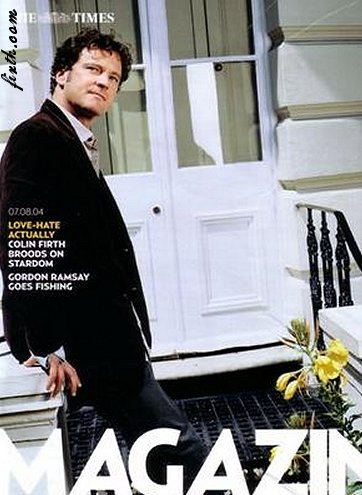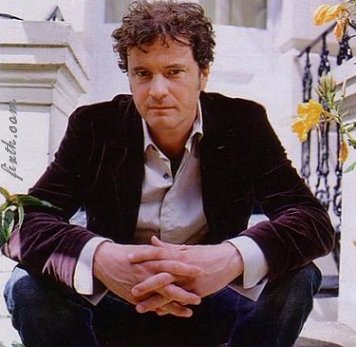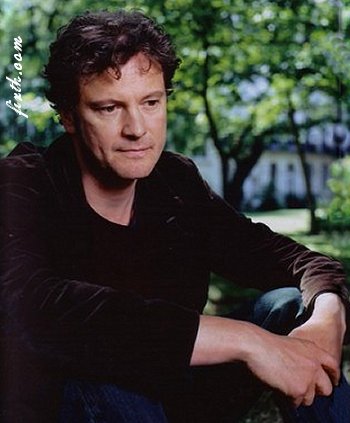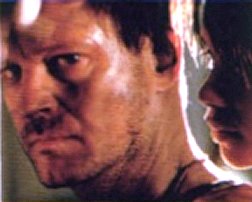The
Reluctant Hero
A decade on, the
nation’s bosom still heaves over his damp-shirted Mr
Darcy, but Janice Turner discovers Colin Firth never aimed to be a sex
symbol
|

|
The last time I
visited the Portobello Hotel was to interview gigolos as they were
photographed, oiled-up and naked, in a bath. I hesitate to mention this
to Colin Firth since our conversation in the hotel’s breakfast room has
hitherto had an earnest, thoughtful air. But he seizes on the subject:
“Were they good-looking? Did they take pride in their work? Were they
gay? Who were their clients?” They love a bit of filth, do actors, and
Firth breaks momentarily with his sensible interview persona to tell me
that Rupert Everett, a rent boy before drama school, had a client who,
many years later, became a close friend (although Everett has never
revealed to him they’d met before in seedier circumstances).
But then, are our romantic
leading men so far removed from gigolos? Both make a living knowing how
to arouse and satisfy female desire. The differences being that film
stars only pretend and are much better paid. Firth is in the highest
echelon of British male fantasy lovers: if Clive Owen is
bit-of-rough/soft, Sean Bean bit-of-rough/hard and Hugh Grant
posh/light, Firth is probably posh/dark. His appeal is not in what he
expresses but in what he is struggling to contain—Mr Darcy having to douse his ardour with
cold water or the artist Vermeer in Girl
with a Pearl Earring, channelling a longing for his
housemaid-model into fervent brushwork.
Firth serves a well-read
female clientele who abhor the obvious and crude, who could only fancy
a mainstream Hollywood hunk in an ironic way. He is subtle, complex and
refined enough for a number of unlikely ladies to emit earthy
“phwoars!” when I mention his name, and grill me jealously about what
he was like.
 So, for
them: Colin Firth
this morning is wearing an unstructured midnight-blue velvet jacket
over jeans. He is as tall (6ft 1in) and as broad as a leading man
should be but seldom is. He is made of excellent stuff that is ageing
well: lush, wavy hair, good but not Los Angeles-white teeth, the
jawline of a leading man but the eyes of a watchful boy. The smile, a
surprise since it is rarely part of his on-screen armoury, renders him
younger. The sexiest thing about him, I find, is his voice: rich and
warm, with a nervous edge that in films plays as choked passion. So
later, when guests keep blundering into the breakfast room and he says,
“Come on, let’s find a room downstairs,” an involuntary exclamation
mark pops up in my brain. So, for
them: Colin Firth
this morning is wearing an unstructured midnight-blue velvet jacket
over jeans. He is as tall (6ft 1in) and as broad as a leading man
should be but seldom is. He is made of excellent stuff that is ageing
well: lush, wavy hair, good but not Los Angeles-white teeth, the
jawline of a leading man but the eyes of a watchful boy. The smile, a
surprise since it is rarely part of his on-screen armoury, renders him
younger. The sexiest thing about him, I find, is his voice: rich and
warm, with a nervous edge that in films plays as choked passion. So
later, when guests keep blundering into the breakfast room and he says,
“Come on, let’s find a room downstairs,” an involuntary exclamation
mark pops up in my brain.
He speaks in well-formed
sentences with a very precise vocabulary. He does more interviews than
most equivalent stars, and I suspect he likes to use them to
demonstrate his intelligence. Because, at his age, 43, he seems to
realise that being a romantic lead, which was far from his career goal,
is not enough. He is queasy about his sex symbol status, even queasy
about acting itself.
His latest film, Trauma, a low-budget British
chiller by Marc Evans, director of cult horror flick My Little Eye, is a return to
grittier, quirkier pre-Darcy roles. Firth plays Ben, an artist who
lives with his ant farm in a creepy converted hospital in Hackney, East
London. We meet him waking from a coma after the car crash that killed
his wife. But Ben is mentally unstable, an unreliable narrator, so
Firth, who is in every scene, does a lot of wild-eyed unshaven emoting
as Ben’s sanity unravels. A gruelling part, I suggest.
“Oh, we love all that,” Firth
says, sardonically (“we” being actors). “You can feel a bit of a
char-monkey sometimes just showing up, getting your make-up on and
phoning something in, then going home. In Trauma I was never off the set,
which means, after a while, you are part of the decision-making
process.”
Later, puzzling over the
phrase “char-monkey”, I do a search and the only thing that pops up is
an interview with Hugh Grant: “Imagine what it’s like, at 42, to be
sitting in hair and make-up,” says Grant. “It’s ridiculous. It’s all
right if you’ve written the film. But to be wheeled on, a char-monkey,
at the age of 42. I hate it.” Firth gives me an only slightly more
measured tirade: “It’s a fairly infantile day—you’re given a time to wake up, you’re
driven to work, someone puts on your clothes. You’re treated like an
18-month-old child!”
The romantic lead’s midlife
crisis appears to manifest itself as professional self-disgust. Being
adored for your handsome plumage starts to feel empty, and not a little
sad, after 40. You crave manly substance. But how to acquire it? Grant
tried producing movies with his company, Simian Films, but that has
stalled after two non-hits, Extreme
Measures and Mickey Blue Eyes.
Firth, however, has no ambitions to produce or direct, and despite
contributing a short story to a collection, Speaking with the Angel, edited by
Nick Hornby, he says he lacks the self-discipline to write.
“I’ve been deformed by the
rhythms that acting gives you, which make you fickle,” he says. “You
give yourself to a job for three months as if nothing else in the world
exists. And then you drop it like a stone. As a director, you have to
make that investment over a couple of years; I don’t know if I’ve got
it in me.
 “The trouble is most of us
choose what we want to do when we are very young, and if it goes well
your success can tie you to it. I sometimes feel I’m stuck in a
profession only a 14-year-old would choose. Even though I love it.” “The trouble is most of us
choose what we want to do when we are very young, and if it goes well
your success can tie you to it. I sometimes feel I’m stuck in a
profession only a 14-year-old would choose. Even though I love it.”
Fourteen is the age at which
Firth, who plodded academically, devoted himself to acting. After
school he found backstage work at the Shaw and National Theatres before
drama school, and was then instantly scooped into the stage play Another Country with Rupert
Everett. The film version followed. Firth has never done the struggling
actor bit, toiled in rep or been out of work.
The Firth template was
moulded early on: the sensitive victim of an experience so terrible it
shuts down his emotions. In Tumbledown
and A Month in the Country
the damage was done in battle, in the Falklands and First World War
trenches respectively. It was this ability to convey simmering internal
conflict—as much as Firth’s dark looks—that made him a perfect Mr Darcy. Any
actor who could embody every teenage girl’s literary crush and that
most potent archetype of female desire, the distant, withholding but
powerful man unlocked by love, would stir half the nation’s loins. But
Firth says it was “the most improbable thing ever to happen to me as an
actor. People would have howled with laughter if I’d tried to predict
it. In fact, they did when it first happened.”
He quotes a theatre review of
a few years before: “Colin Firth doesn’t have enough romantic charisma
to light a 50-watt bulb.” And he was 33: “Too long in the tooth to play
the romantic stuff. I thought this would be my last throw of the dice.”
It’s a decade since Darcy, but women have not forgotten, and many fan
sites celebrate a wet-shirted Colin. Such as firthfrenzy.com or
firth.com, the latter a fastidious, stalkerish temple to their hero,
who is respectfully referred to as ODB (Our Dear Boy). They send him
edifying books as well as their panties: he is probably pursued by the
most intelligent horny women in the world.
“I have no idea what Tom
Cruise’s fans feel about him,” says Firth, uncomfortably. “There are
some actors who, wherever they go, people show up because they think
they are fantastic. Then there are slightly marginalised people who are
like somebody’s secret. I feel like a second division football team
that has this following who are more into it for the fellowship of each
other.”
I ask if he’s ever “googled”
himself for fun and he shudders. “That way lies madness. It would be
horrendous to listen to people who don’t know you discuss you in this
proprietorial way.”
Post-Darcy, most of his roles
have had a similar dramatic arc: romantically hurt guy healed by new
love, as in his last Hollywood vehicle, Hope Springs, a rom-com so silly
and limp it appears on lists of worst movies ever. He has a sideline in
cuckolds: uptight upper-class ones in The
English Patient and Shakespeare
in Love, or gloomy souls dumped for a more fun guy, as in Love Actually.
He is aware of his
repertoire’s limitations: “I got a bit of a jolt in Girl with a Pearl Earring when the
director said something about my brooding looks. And I thought, that
wasn’t supposed to be a f****** brooding look!” But the darkness is all
external. “I’m not a brooding person,” he insists. “But when it comes
to things like music or literature I am drawn to the dark stuff. That’s
what is most passionate, risky and interesting.” Trauma director Evans
describes Firth as “the most even-keeled, amusing, easy-to-be-with
person. I’ve never seen a dark side to him except on screen.”
Firth in
person does convey
an ease with himself, probably attributable to his solid family
background. His parents, now around 70, are both academics, whose
postings to America and Nigeria gave Firth, his younger brother and
sister a peripatetic childhood. This bookish environment explains his
fear of “char-monkey” vacuity and a tendency to intellectualise his
roles. He spent hours studying Vermeer for Girl with a Pearl Earring,
prompting Scarlett Johansson, who didn’t even read Tracy Chevalier’s
book, to comment drily: “Colin probably thinks he painted all the
paintings himself.”
It was also an ascetic and
thrifty upbringing. “It annoyed me sometimes that they weren’t more
avaricious. I would like to have had more gadgets in the house, more
expensive toys.” The kind of childhood that makes him feel, even today,
“conditioned to save silver foil because it used to be expensive”, is
an excellent inoculation against the meretricious world of movies.
Firth has never been enamoured of Hollywood, never chased it hard even
after Bridget Jones’s Diary,
his biggest box-office hit. “Los Angeles is such an untenable place to
be,” he says. “People come home and go straight to their answering
machines, obsess that they aren’t invited to some premiere. You laugh
it off for a week or two, then you get sucked in.”
 But
neither is America always
enamoured with Firth, often reading his English restraint as woodenness
and preferring the more quicksilver charms of Hugh Grant. Although they
seldom meet, there is an undeniable rivalry between the two, played out
in their on-screen fist-fight in Bridget
Jones, with a rematch in Edge
of Reason, out later this year. Grant’s character—witty, sexy but heartless Daniel Cleaver—is the closest he has played to his real
self. And there is much of the slightly pompous decency of Mark Darcy
in Firth. But
neither is America always
enamoured with Firth, often reading his English restraint as woodenness
and preferring the more quicksilver charms of Hugh Grant. Although they
seldom meet, there is an undeniable rivalry between the two, played out
in their on-screen fist-fight in Bridget
Jones, with a rematch in Edge
of Reason, out later this year. Grant’s character—witty, sexy but heartless Daniel Cleaver—is the closest he has played to his real
self. And there is much of the slightly pompous decency of Mark Darcy
in Firth.
While Firth’s intensity means
he is often cast as an artist (Trauma,
Pearl Earring, Hope Springs) or writer (Love Actually) the spivvier,
shallower Grant plays someone who sells books (Notting Hill, Bridget Jones) or
paintings (Mickey Blue Eyes).
At this, Firth gives a small, satisfied smile.
“Hugh is a
brilliant
raconteur, a very funny guy,” he says. “In the DVD commentary for Love Actually he takes the piss out
of me relentlessly. He says, ‘In this scene they photographed him
higher up to try and make him look thinner.’ Or, ‘What’s that rinse
he’s using in his hair?’ It is very funny. The rights and clearances
department at Universal sent me the tape; they thought I might sue. But
if I don’t play the game it will seem rather petulant.”
But in the private
sphere it
is Grant who is cast in darkness while Firth basks in the sun. Grant
has looked anchorless since he split with Liz Hurley, bouncing around
the social pages, creating kiss-and-tells. Meanwhile, Firth seems
profoundly happy with his Italian wife, Livia Giuggioli, 33, a TV
producer he met on the set of Nostromo
in 1997. Nick Hornby has described Livia—with her beauty, culinary skills and PhD—as “joke-perfect”. Her attitude to the
cult of Darcy is amused bewilderment. They have two sons, Matteo, born
last year, and three-year-old Luca, whose cute bilingualisms Firth
proudly recounts. Italy, where he spends around three months a year,
also gives Firth respite from the low-level but wearing hassle of fame.
Firth is keen to point out he
has another son, Will, 13, by Meg Tilly, the Canadian actress he met
filming Valmont in 1989.
Firth moved to backwoods British Columbia for five years, at some price
to his career, until the relationship finally broke down. After that,
he spent stints as a single parent during Will’s long summer visits.
A solidness in his personal
dealings has, he says, been his ballast against the instability of his
profession. “My interpretation of growing up is mostly to do with a
capacity to stick with something. Whether it is a professional project,
a mission or a marriage.”
For the jaded fortysomething
romantic lead, a rich home life is a grand compensation. It certainly
stops any fears about losing your looks. I ask Firth if he worries
about body-revealing bedroom scenes as he gets older. “I go for a run,”
he shrugs. “I know that if I ate everything I wanted I’d turn into a
blob and that’s age. But I could never take the time it would require
to get my body up to Los Angeles standards. I would change profession
first.”
Trauma is released
on August 27
|

 So, for
them: Colin Firth
this morning is wearing an unstructured midnight-blue velvet jacket
over jeans. He is as tall (6ft 1in) and as broad as a leading man
should be but seldom is. He is made of excellent stuff that is ageing
well: lush, wavy hair, good but not Los Angeles-white teeth, the
jawline of a leading man but the eyes of a watchful boy. The smile, a
surprise since it is rarely part of his on-screen armoury, renders him
younger. The sexiest thing about him, I find, is his voice: rich and
warm, with a nervous edge that in films plays as choked passion. So
later, when guests keep blundering into the breakfast room and he says,
“Come on, let’s find a room downstairs,” an involuntary exclamation
mark pops up in my brain.
So, for
them: Colin Firth
this morning is wearing an unstructured midnight-blue velvet jacket
over jeans. He is as tall (6ft 1in) and as broad as a leading man
should be but seldom is. He is made of excellent stuff that is ageing
well: lush, wavy hair, good but not Los Angeles-white teeth, the
jawline of a leading man but the eyes of a watchful boy. The smile, a
surprise since it is rarely part of his on-screen armoury, renders him
younger. The sexiest thing about him, I find, is his voice: rich and
warm, with a nervous edge that in films plays as choked passion. So
later, when guests keep blundering into the breakfast room and he says,
“Come on, let’s find a room downstairs,” an involuntary exclamation
mark pops up in my brain.
 But
neither is America always
enamoured with Firth, often reading his English restraint as woodenness
and preferring the more quicksilver charms of Hugh Grant. Although they
seldom meet, there is an undeniable rivalry between the two, played out
in their on-screen fist-fight in
But
neither is America always
enamoured with Firth, often reading his English restraint as woodenness
and preferring the more quicksilver charms of Hugh Grant. Although they
seldom meet, there is an undeniable rivalry between the two, played out
in their on-screen fist-fight in